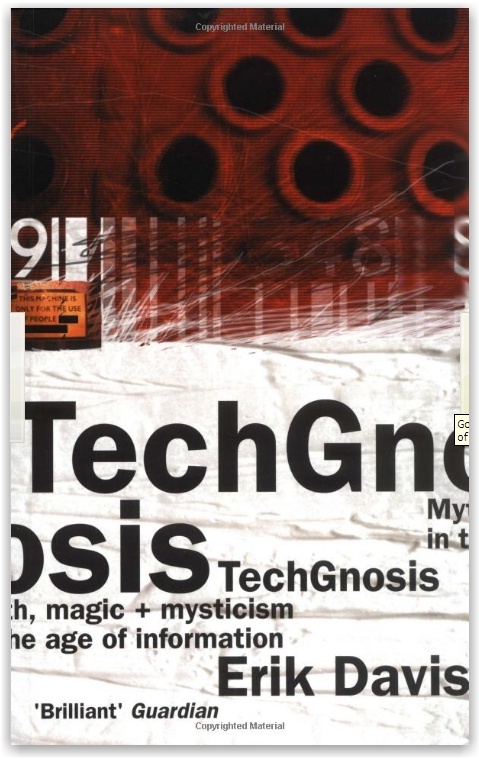Erik Davis: TechGnosis: Myth, Magic & Mysticism in the Age of Information.
Propast mezi technologickou mentalitou a mystickým pohledem nemusí být tak veliký, jak se zdá být. Erik Davis se dívá na moderní informační technologii – a hodně na předchozí technologii – aby odhalil, kolik z ní má své kořeny v spirituálních postojích. Nadto zkoumá, jak ti, kdož vítají s otevřenou náručí každý nový technologický pokrok, činí tak často na podkladě vzorů a očekávání vyrůstajících z religiózní senzibility. Přitom Davis porovnává i dává do kontrastu vědecký postoj, že můžeme poznat realitu technologicky a gnostickou ideu konečného poznání. Ačkoliv je vše vměstnáno do pochopitelných kapitol, je tu i prvek silného proudu vědomí vlastního Davisovu dílu. Jeho výklady se mohou lehce např. rozběhnout od informační teorie až k mlhovité povaze gnosticismu a filosofickému problému zla, a to na pár stránkách. Je to, jakoby tu existovalo tolik spojitostí, že Davisův text začne probíhat zpět a dopředu napříč časem a prostorem bez ohledu na řádky. Jenomže výsledek není chaotický, jak by se dalo očekávat, nýbrž je v živé souhře s velkou šíří idejí. Jeho styl je právě tak živorodý, jakož i všeobecně objímající – i když někdy zabrousí do splínu. Venkoncem uspěl ve snaze ukázat, že spirituální stránku toho, co někteří mohou vnímat jako studené technologické myšlení.

In the new millennium, will we drop our messy bodies and upload our minds and souls into tidy android containers? Why not, argues Davis, a Wired contributor whose hip, erudite first book argues for the survival of a kind of gnostic mysticism in the age of information technology, carried over from the specifically Christian movement of late antiquity. Davis marshals an impressive, even exhausting, amount of evidence from Eastern and Western literature, history, philosophy, scripture and popular culture to support his sometimes opaque position on the matter of technology’s impact on human spirituality and vice versa. In wave after wave of hybrid vocabulary („mythinformation,“ „netaphysician,“ „cyberdelia,“ etc.), he offers a dizzying implosion of simulated hypertext, leaping from an authentic Gnostic poem to a ’60s rock concert to the Advanced Dungeons & Dragons Player’s Handbook to the latest cultic catastrophe. This deluge of information and theory manages to be quite entertaining („Already in Homer, Hermes is a multitasking character“), but, ultimately, readers may be unsure whether to applaud Davis’s conclusion that the phallic vector of technological development has been supplanted by a womblike matrix. But it’s not always the destination that matters, and readers who hang on will find that surfing Davis’s datastream makes for an exhilarating ride.
– Publishers Weekly
Paperback: 372 pages
Publisher: Five Star (March 1, 2005)
Language: English
ISBN-13: 978-1852427726

